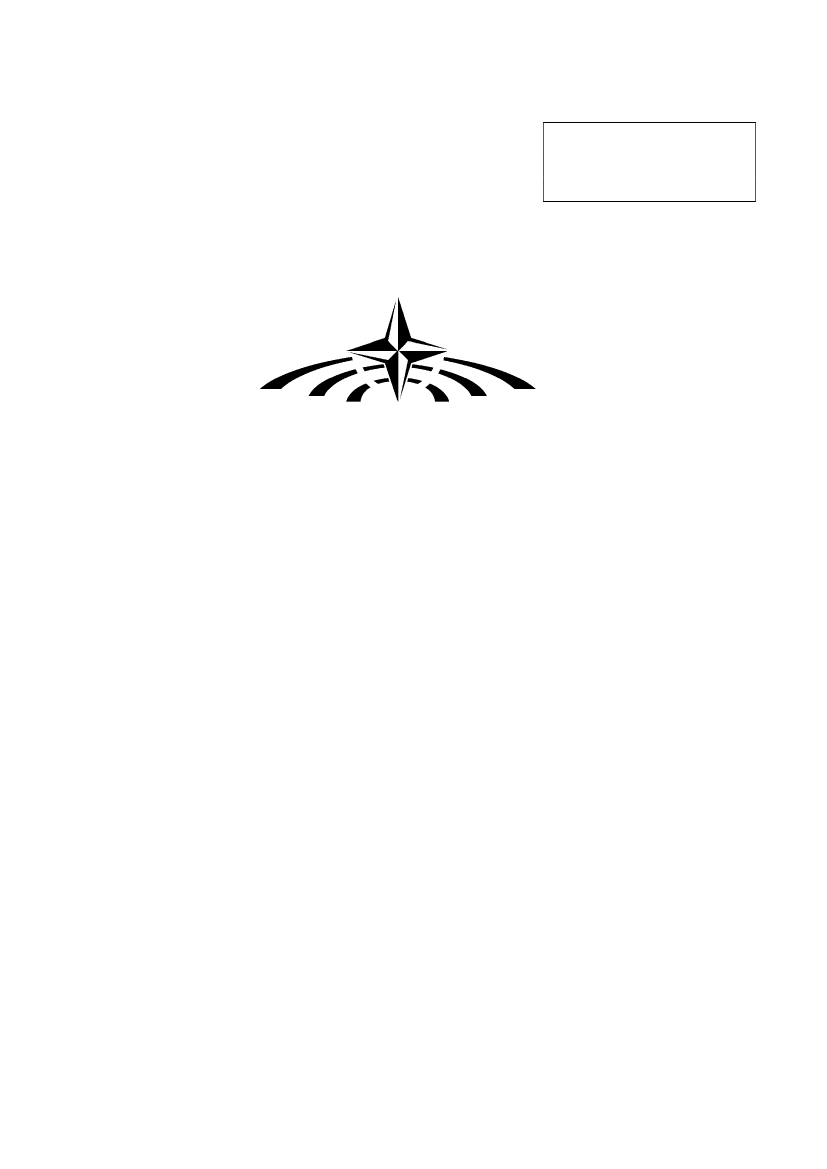NATOs Parlamentariske Forsamling 2009-10
NPA Alm.del Bilag 30
Offentligt
157 NRPC 10 EOriginal: English
NATO-RUSSIAPARLIAMENTARYCOMMITTEE
NATO Parliamentary Assembly
SUMMARYof the meeting of the NATO-Russia Parliamentary CommitteeHall C, Kipsala International Exhibition CentreRiga, Latvia
Monday 31 May 2010
International Secretariat
June 2010
157 NRPC 10 E
i
ATTENDANCE LISTPresidentVice-PresidentsJohn TANNER (United States)Assen AGOV (Bulgaria)Jean-Michel BOUCHERON (France)Jane CORDY (Canada)Sven MIKSER (Estonia)Hendrik Jan ORMEL (Netherlands)Pierre Claude NOLIN (Canada)David HOBBS
TreasurerSecretary GeneralMEMBERS AND ALTERNATE MEMBERSAlbaniaBelgiumBulgariaCroatiaCzech RepublicDenmarkEstoniaFranceGermanyGreeceLatviaLithuaniaLuxembourgNetherlandsNorwayPolandPortugalRomaniaRussian FederationSlovakiaSloveniaSpainTurkeyUnited KingdomUnited States
Leonard DEMIGent STRAZIMIRIYolande AVONTROODTDobroslav DIMITROVKresimir COSICJiri ZAKHelge Adam MOELLERJohn Dyrby PAULSENMati RAIDMAJosselin de ROHANUlla SCHMIDTEftychios DAMIANAKISVaira PAEGLEAndrius MAZURONISMarc ANGELHendrik Jan ORMELMarit NYBAKKErna SOLBERGWladyslaw SIDOROWICZJosé LELLOSever VOINESCU-COTOIVictor A. OZEROVLubov SLISKAJán KOVARCIKBranko GRIMSRamon ALEUJesus CUADRADOYahya DOGANVahit ERDEMBruce GEORGELord JOPLINGDennis MOOREDavid SCOTT
157 NRPC 10 E
ii
COMMITTEESDefence and SecurityEconomics and SecurityPoliticalScience and Technology
Julio MIRANDA CALHA (Portugal), ChairmanHugh BAYLEY (United Kingdom), ChairmanKarl A. LAMERS (Germany), ChairmanMichael MATES (United Kingdom), Chairman
SECRETARIES OF DELEGATIONSBelgiumBulgariaCanadaCroatiaDenmarkEstoniaFranceGermanyGreeceHungaryItalyLatviaLithuaniaLuxembourgNetherlandsNorwayPolandRomaniaRussian FederationSlovakiaSloveniaSpainTurkeyUnited KingdomUnited States
Frans VAN MELKEBEKEBorislav PENCHEVJames M. LATIMERMaroje KATALINICFlemming Kordt HANSENTanja ESPEEtienne SALLENAVEFrédéric TAILLETAnnemarie BÜRSCHClaudia RATHJENVassiliki IOANNIDOUKároly TÜZESAlessandra LAISandra PAURASnieguole ZIUKAITEPia BISENIUSArjen WESTERHOFFAtle Konta MIDTTUNMichal GARGANISZIrina BOJINViacheslav KOLOTVINMarina YAKOVLEVAJarmila NOVAKOVATamara GRUDEN-PECANMercedes ARAUJOYesim USLUSarah IOANNOUMelissa ADAMSON
SPEAKERS
Professor Alexei PUSHKOVDirector of the Institute of ContemporaryInternational Studies at the Diplomatic Academyof the Russian Ministry of Foreign AffairsAlexander VERSHBOWUS Assistant Secretary of Defense forInternational Security Affairs (ISA), Former USAmbassador to the Russian Federation, FormerUS Ambassador to NATO
157 NRPC 10 E
iiiAndrius AVIZIUSHenrik BLIDDALAnthony BONENRoberta CALORIOPaul COOKBenoît GOMISChristine HEFFINCKSusan MILLARReena PANCHALNadia PAVLOVSKAJacqueline PFORRRuxandra POPAAndrea PRETISSteffen SACHSZachary SELDENSvitlana SVYETOVAAlex TIERSKY
INTERNATIONAL SECRETARIAT
157 NRPC 10 E
1
I.
Opening of the proceedings
1.The meeting opened on Monday 31 May 2010 at 10:15 with John Tanner, President ofthe Assembly, in the Chair.2.The Chairmanwelcomed participants to the NATO-Russia Parliamentary Committee(NRPC), which is the parliamentary counterpart to the NATO-Russia Council (NRC).II.3.Adoption of the draft Agenda [104 NRPC 10 E rev.1]The draft Agenda [104 NRPC 10 E rev.1] was adopted.
III.
Adoption of the summary of the meeting of the NATO-Russia ParliamentaryCommittee held in Edinburgh, United Kingdom, on Friday 13 November 2009[228 NRPC 09 E]
4.The summary of the meeting of the NATO-Russia Parliamentary Committee held inEdinburgh, United Kingdom, on Friday 13 November 2009 [228 NRPC 09 E] was adopted.
IV.
Presentation onRussia’s National Security Strategy and Military DoctrinebyProfessor Alexei Pushkov, Director of the Institute of Contemporary InternationalStudies at the Diplomatic Academy of the Russian Ministry of Foreign Affairs; Host,Author and Executive Producer of the TV programmePostscriptumThe Chairman introduced Professor Pushkov.
5.
6.Professor Pushkov has an impressive career in the media. He has held positions of DeputyEditor, Foreign Policy and Political Columnist, Deputy Director General of Public and MediaRelations, and Director of Foreign Affairs of the Russian Public TV channel ORT. He also servedas Policy Adviser and Speechwriter to Michael Gorbachev. Professor Pushkov was also a lecturerat Moscow University. He has written more than 350 articles in the Russian and international pressand conducted more than 400 TV and radio interviews. He is also the author of two books:ThePutin’s SwingsandRussia in Global Geopolitics.Professor Pushkovidentified two major trends that are substantially altering the global7.political landscape. Firstly, the emerging multi-polar world. Although the United States remains themost influential pole, it is no longer the only centre of gravity. Secondly, there is a growinginterdependence amongst various poles, amplified by the recent economic downturn. In thiscontext, it would be a serious mistake to shun co-operation amongst the major poles. That said,the philosophy and attitudes towards each other are not adapted to present times and remainmarred by the “ghosts of the past”. These attitudes must change, not only in Russia, but alsoamongst other powers.8.The speaker said that the new Russia’s military doctrine contains elements of both old andnew thinking. Doctrines and national security concepts do not change easily, he said.NATO-Russia relations suffered regularly as a result of crisis over the Alliance’s eastwardenlargement, the military operation in Yugoslavia and, most recently, over the Russo-Georgianwar.9.Professor Pushkov argued that the basic premises of geopolitics do not change: any countrywould feel uneasy to see an expanding military Alliance at its borders, particularly since NATO is
157 NRPC 10 E
2
not merely a defence Alliance – it projects its power beyond its borders. Therefore, it isunderstandable that Russia sees NATO as a potential problem. He pointed out that the newdoctrine did not identify NATO itself as a threat – the real threat is the possible new wave ofNATO’s expansion.10. Russia was particularly struck by the wording of the Bucharest Summit declaration, whichsaid that Ukraine will become a NATO member. Professor Pushkov believed that it was anundemocratic statement since the majority of Ukrainians do not want NATO membership.Promoting democracy cannot be used as an argument to include Ukraine, which already exercisesdemocratic practices.11. Professor Pushkov also identified the most promising areas of cooperation between NATOand Russia, including resumed military cooperation, joint efforts in combating terrorism, piracy,proliferation of weapons of mass destruction and closer cooperation in the stabilization andreconstruction of Afghanistan.12. The main points of contention, on the other hand, include 1) the “open door” policy towardsUkraine; 2) differences in attitude towards Georgia. NATO supports its territorial integrity, butRussia is unlikely to reverse its stance on the sovereignty of Abkhazia and South Ossetia;3) Russia’s proposal of a new European security treaty. NATO does not see the necessity of it.However, the current European security architecture is predominantly NATO-centric. It is notcomprehensive and does not include several important countries in Europe, including Russia;4) different approaches on the future of the CFE treaty; 5) the concept of a global NATO issomething that is not easy for Russia to accept. Of course, Russia does not deny that one’ssecurity might be affected by threats emanating from distant regions. However, the principalquestion is how to address these threats. Should the United Nations play a key role in this regard?13. Professor Pushkov believed the NATO Secretary General Mr Rasmussen was right when hesaid that NATO would never attack Russia. The same is true about Russia’s intentions towardsNATO. However, the contemporary threat perception is larger than the possibility of a directmilitary attack. Larger military superiorityper seenables the stronger body to dictate its terms inthe international political arena. In this context, Russia opposes the deployment of the US missiledefence system at its borders. Even if these missiles are purely defensive, they increase NATO’smilitary superiority vis-à-vis Russia. It also violates the 1997 Founding Act between NATO andRussia.14. In conclusion, Professor Pushkov discussed possible options to improve NATO-Russiacooperation. The first option includes the gradual minimization of issues of contention. Forinstance, both sides should find some common ground on a new European security architecturewhich would include Russia. Some issues of contention will remain, such as the status of Abkhaziaand South Ossetia, and both sides will have to learn to live with that.15. The second option is more radical and involves Russia’s full membership in the Alliance. Thisidea is being increasingly discussed in some NATO countries. Although Professor Pushkovdoubted that such a prospect was realistic, the discussion itself could lead to positive results. Sucha discussion would challenge the notion that some of the principles NATO and the RussianFederation stick to are unmovable. Without revisiting their principles and preconceptions, bothsides will not be able to achieve substantial progress in their relationship and to move forward.16.The Chairman thanked Professor Pushkov for his presentation.
157 NRPC 10 E
3
IV.
Commentary by Alexander Vershbow, US Assistant Secretary of Defense forInternational Security Affairs (ISA), Former US Ambassador to the RussianFederation, Former US Ambassador to NATOThe Chairman introduced Alexander Vershbow.
17.
18. Alexander Vershbow joined the US Department of Defense after a 32-year career with theUS Foreign Service. He served as US Ambassador to NATO; US Ambassador to the RussianFederation; and US Ambassador to the Republic of Korea. He has held numerous senior positionsin Washington, including Special Assistant to the President and Senior Director for EuropeanAffairs at the National Security Council, and State Department Director for Soviet UnionAffairs. Alexander Vershbow is a long-term student of Russian Affairs and International Relations.He received a B.A. in Russian and East European Studies from Yale University, a Masters Degreein International Relations and a Certificate of the Russian Institute from Columbia University. Hewas the first recipient of the Department of Defense’s Joseph J. Kruzel Award for his contributionsto peace in former Yugoslavia (1997).19.Ambassador Vershbowsaid that he has been working for more than two decades on tryingto improve NATO-Russia cooperation. He disagreed with most of Professor Pushkov’s analysesbut agreed with the conclusion that NATO and Russia need to improve cooperation, not only byimproving the tone, but by finding as many substantive areas of cooperation as possible. NATOand Russia share common interests and face the same challenges. It will take time to overcomesuspicion. There is a need to cooperate on substance and there is a need to see more unequivocalcommitment from high-level officials. The potential of the NATO-Russia Council has not beenfulfilled. Ministers should develop a working programme, which could produce concrete examplesof cooperation, for example, fighting narco-trafficking in Afghanistan and more joint militaryexercises. Even a controversial subject such as missile defence could be transformed into an areaof cooperation. The NRC should change from being a talking shop to having more operationalcooperation.20. Ambassador Vershbow noted that there is concern about Russia’s Military Doctrine whichstates that NATO enlargement is a threat to Russia. When the NATO-Russia Founding Act and theRome declaration were signed, it was clear that NATO and Russia do not see each other asadversaries. NATO enlargement is not a recruitment process, it is an “open door” policy and thiswill be reaffirmed in the New Strategic Concept. With reference to Ukraine, NATO respectsUkraine’s sovereign choice. The previous government pursued NATO membership but the currentgovernment took a different approach and NATO respects its choice but will look forward tocontinued cooperation, especially on defence reform. Georgia continues to seek membership.NATO will encourage Georgia to use the mechanisms available so that it can qualify formembership in the future.21. The Ambassador noted that there is concern with regard to the CFE treaty. While othernations abide to this agreement, Russia does not ratify it. There is a need to revive the agreementso that it can be ratified, or there should be a new framework, which nations could ratify. Thisconcerns not only Russia, but also Ukraine and Georgia. He also said there was a need torevitalise the OSCE and perhaps to build upon President Medvedev’s proposal on conflictprevention, so that the OSCE can diffuse future tensions. On the Strategic Concept, Ambassadorreassured members that it will not redefine NATO as a global player. A group of experts outlinedthe importance of partners, including Russia. The U.S. also has a National Security Strategy whereit outlines cooperation with partners. In conclusion, Ambassador said that partnership should notbe a slogan, but a reality.22.Hendrik Jan Ormel(NL) agreed that the “ghosts of the past” are the principle obstaclehindering the improvement of NATO-Russia relations. However, the signals coming from Russia
157 NRPC 10 E
4
are contradictory: on the one hand, Mr Putin declared that the collapse of the Soviet Union was amistake. On the other hand, the reaction of the Russian leadership to the Polish airplane tragedywas very noble.23. Professor Pushkov said that Mr Putin referred to the disintegration of the USSR as a‘catastrophe’ rather than a ‘mistake’. Nevertheless, overcoming stereotypes takes time and no onecan be completely free of them, not just the Russians. For many of them, the break-up of theSoviet Union was very painful.24.Karl A. Lamers(DE) said he had a problem with Professor Pushkov’s statements that NATOis a military Alliance and that the “open door” policy is a threat. He asked Professor Pushkov if heagreed with the statement that NATO is a political Alliance with military capabilities. And if heagreed that countries have the right to make their own choices. He stressed that only NATO candecide on membership and no other country can veto NATO’s decisions.25.Sven Mikser(EE) noted that there is a big difference between Russia’s own and NATOcountries’ perception of enlargement. Russia thinks that NATO is an anti-soviet pact which goes tocapitals trying to recruit nations. Estonia had to work hard to achieve membership, and nobody“pulled” Estonia into NATO. Enlargement today is demand-driven and not supply-driven like it wasin the past. Mr Mikser said that he also noted a contradiction in Professor Pushkov’s presentation.“We should not continue living in the past, said Professor Pushkov and, at the same time, he said“laws of geopolitics did not change since the time of Bismark.” Mr Mikser asked Professor Pushkovto comment on this contradiction.26. In response to Mr Mikser’s question, Professor Pushkov reiterated that the traditionalprinciples of geopolitics are still applicable: the United States, for instance, would probably beworried if Mexico – hypothetically – decided to join the Collective Security Treaty Organisation.Even very limited military cooperation between Russia and Venezuela seems to be causingdiscontent in Washington. No matter how old-fashioned these principles of geopolitics mightappear, they seem to work, and therefore cannot be ignored.27. On Mr Lamers’ question, Professor Pushkov stressed that the military facet of the Alliance isvery substantial, and therefore it features prominently in Russia’s foreign and security policycalculations. He acknowledged the right of sovereign nations to join NATO, but he also believedthat Russia’s right to react to this development is equally legitimate. Professor Pushkov alsostressed that Russia does not demand the right of veto; it simply wants its arguments to be heardand understood.28. Ambassador Vershbow noted that the US military presence abroad, including in the vicinityof Russia, is not a unilateral act and is always based on agreements with and requests from itsAllies. Regimes such as Venezuela are sponsoring terrorists and add to the destabilization of theregion. However, the United States government refrains from overreacting to Russia’s support forthis regime. On the Iranian issue, he pointed out that Tehran is rapidly developing ballistic missilecapability. To defend against this threat, adequate missile defence systems need to be in place.Russia’s contribution in this regard would be most welcome and might have an impact on Tehran’scalculations.29. A Romanian member said that Professor Pushkov confirmed that the new Russian militarydoctrine reflects “old thinking”. He asked Professor Pushkov why he saw NATO as a militaryAlliance and did not see any democratic values within the organisation. He also askedProfessor Pushkov to comment on his statement that NATO and Russia should change some oftheir principles. What principles should NATO change? And what is the difference in the situationin South Ossetia, Abkhazia and Kosovo? There is a contradiction in the fact that Russia did not
157 NRPC 10 E
5
recognise the independence of Kosovo but did recognise the independence of South Ossetia andAbkhazia.30.Kresimir Kosic(HR) said that there are a lot of opportunities to shape cooperation. Forexample, in Afghanistan where there is a common interest to stop drug trafficking and improveborder security. India and China should be also involved in cooperation on Afghanistan.31. Professor Pushkov replied to the Romanian member that NATO is a military Allianceamongst other things. He saw values but those did not belong to NATO. These values have beendeveloped before NATO and NATO cannot privatise them. NATO is more about security thanvalues. Better progress with Russia could be achieved by changing principles. The “open door”principle is fine but not when it happens on the Russian border. Russia cannot accept that itsneighbour Ukraine becomes a member of NATO. Many Russian people live in Ukraine. The samegoes for Georgia.32.Assen Agov(BG) said that he visited Georgia with a NATO PA delegation and met withdisplaced people who told him that their territory had been occupied. Russia did not join the CFETreaty and has been building up military facilities in South Ossetia and Abkhazia. He saw it as athreat and asked about the prospects to ratify the CFE Treaty.33.Jesus Cuadrado(ES) asked about the potential for NATO-Russia co-operation inAfghanistan and in counter-piracy operations.34. Ambassador Vershbow said that the U.S. is concerned about the fact that Russia suspendedthe implementation of the CFE Treaty. Bringing Russia back into compliance with the CFE is animportant goal for the Alliance. With good will, this goal can be achieved, although a number ofissues will be difficult to resolve, not least the deployment of Russian troops in Abkhazia and SouthOssetia that are not recognized as independent entities by NATO countries, as well as by most ofthe international community. He also saw many opportunities to further develop NATO-Russiacooperation in Afghanistan and in anti-piracy operations.35. Professor Pushkov agreed that the anti-piracy campaign presents an excellent opportunityfor cooperation and could even be a ‘game-changer’ in NATO-Russia relationships. OnAfghanistan, he underlined that Russia is grateful for the NATO efforts there, as they are directedat stabilising this region of vital importance to Russia’s security. However, due to the devastatingexperience of the USSR in this country, Russia cannot be expected to send its men there again.Russia is prepared to help the NATO effort in other ways, however, for instance as a transitcountry or in terms of political support.36. With regard to Russia’s military build-up in the Black Sea region, Professor Pushkov said thatit was merely a reaction to Georgia reinforcing its military capacity as well as to American basesbeing established in Romania and Bulgaria.37.David Scott(US) said that the U.S. greatly appreciated the signing of the START treaty butwanted to mention the critical issue of Russia’s position on Iran. Russia had supported Iran’snuclear programme for 14 years. What is Russia’s position on Iran now?38. An Albanian member indicated that Professor Pushkov had repeated three times the phrase,“we want to be heard.” He asked why the existing NATO-Russia framework was not enough “forbeing heard”.39. Professor Pushkov replied that the framework was fine, but that people listen and say “ok,thank you.” For example, what happened to President Medvedev’s proposal? It had been heardbut there was no follow up. Russia is disappointed about that. There are different ways of hearing
157 NRPC 10 E
6
and reacting. Russia wants to see more reaction, such as “what can we do about it”, rather than“ok, thank you.” On Iran, Professor Pushkov said that Russia is not interested in Iran havingnuclear weapons, and the evidence of this was Russia’s support of the UN resolution. Russiaunderstands it is a serious issue and will support a diplomatic solution but is against military action.40. Ambassador Vershbow noted that the NATO-Russia discussion should be meaningful, andthat NATO and Russia should listen to each other. There are a lot of joint efforts, for example inBosnia, Russia’s participation was very productive. The same cooperation could have beenachieved in Kosovo but an opportunity had been missed. There is clearly a need to have more jointprojects, for example, related to military cooperation and cooperation on missile defence andpiracy. NATO and Russia should build on common threat perceptions to come up with commonresponses.41.Bruce George(UK) noted that although problems and tensions between the Alliance andRussia exist, the situation has markedly improved compared with the times of the Cold War. Thereare signs that Russia is changing, but more evidence and positive gestures on Moscow’s part areneeded to gain the full trust of the Euro-Atlantic community.42.Lubov Sliska(RU) said that the Russian delegation fully agreed with the argumentsexpressed by Professor Pushkov. She stressed the importance of dialogue across a broad rangeof issues of common concern.43.44.Chairman Tanner thanked the speakers for their presentations and closed the meeting.The meeting was closed at 11:45.
___________










